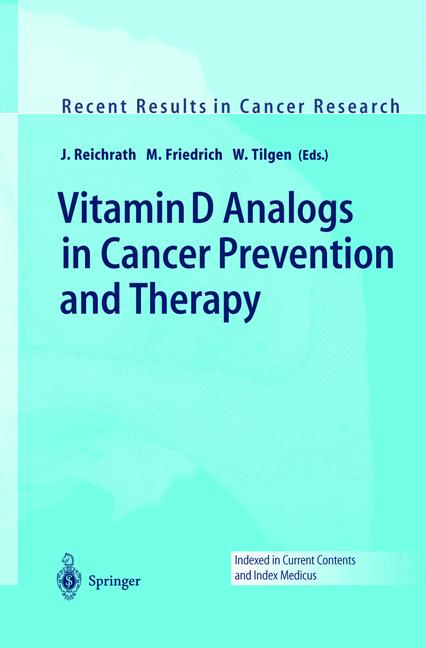This volume provides a comprehensive, highly readable overview of the topics discussed at the First International Symposium on "Vitamin D Analogs in Cancer Prevention and Therapy" held in Homburg/Saar, Germany in May 2002. Leading researchers discuss our present knowledge of the vitamin D system in cancer. Topics range from the newest findings in molecular biology, epidemiology, synthesis and metabolism of vitamin D to new concepts for the use of vitamin D analogs in cancer prophylaxis and treatment. The book provides essential up-to-date information for every researcher or clinician interested in the biology of vitamin D or cancer.
Inhaltsverzeichnis
1 Molecular Biology of Vitamin D. - Evolution and Function of Vitamin D. - Current Understanding of the Function of the Nuclear Vitamin D Receptor in Response to Its Natural and Synthetic Ligands. - Approaches to Evaluating the Association of Vitamin D Receptor Gene Polymorphisms with Breast Cancer Risk. - Ligand Structure Function Relationships in the Vitamin D Endocrine System from the Perspective of Drug Development (Including Cancer Treatment). - Antiproliferative Signalling by 1, 25(OH)2D3 in Prostate and Breast Cancer Is Suppressed by a Mechanism Involving Histone Deacetylation. - Mechanisms Implicated in the Growth Regulatory Effects of Vitamin D Compounds in Breast Cancer Cells. - Squamous Cell Carcinomas Fail to Respond to the Prodifferentiating Actions of 1, 25(OH)2D: Why? . - A Novel Vitamin D-Regulated Immediate-Early Gene, IEX-1, Alters Cellular Growth and Apoptosis. - Extrarenal Sites of Calcitriol Synthesis: The Particular Role of the Skin. - Cultured Rat Growth Plate Chondrocytes Express Low Levels of 1a-Hydroxylase. - Gene Amplification and Splice Variants of 25-Hydroxyvitamin D3 1, ? -Hydroxylase (CYP27B1) in Glioblastoma Multiforme A Possible Role in Tumor Progression? . - Regulation of the 25-Hydroxyvitamin D-1? -Hydroxylase Gene and Its Splice Variant. - Combination of Vitamin D Metabolites with Selective Inhibitors of Vitamin D Metabolism. - Importance Of Cytochrome P450-Mediated Metabolism in the Mechanism of Action of Vitamin D Analogs. - 2 The Vitamin D System in Cancer. - The Role of Vitamin D in Prostate Cancer. - Vitamin D Autocrine System and Prostate Cancer. - Analysis of the Vitamin D System in Cervical Carcinomas, Breast Cancer and Ovarian Cancer. - Short-Chain Fatty Acids and Colon Cancer Cells: The Vitamin D Receptor-Butyrate Connection. - Analysis of theVitamin D system in Cutaneous Malignancies. - 3 Antitumor Effects of Vitamin D Analogs. - Evaluation of Vitamin D Analogs as Therapeutic Agents for Prostate Cancer. - Design, Synthesis, and Biological Studies of the A-Ring-Modified 1, 25-Dihydroxyvitamin D3 Analogs. - Induction of Apoptosis by Vitamin D Metabolites and Analogs in a Glioma Cell Line. - Vitamin D Analogs and Breast Cancer. - A Low-Calcemic Vitamin D Analog (Ro 25-4020) Inhibits the Growth of LNCaP Human Prostate Cancer Cells with Increased Potency by Producing an Active 24-Oxo Metabolite (Ro 29 9970). - Prospects for Vitamin D receptor Modulators as Candidate Drugs for Cancer and (Auto)immune Diseases. - The Role of Reactive Oxygen Species in the Anticancer Activity of Vitamin D. - 4 Vitamin D in Cancer Prevention. - Ecologic Studies of Solar UV-B Radiation and Cancer Mortality Rates. - Phytoestrogens and 17b-Estradiol Influence Vitamin D Metabolism and Receptor Expression-Relevance for Colon Cancer Prevention. - Efficacy and Mechanism of Action of 1a-hydroxy-24-ethyl-Cholecalciferol (1a[OH]D5) in Breast Cancer Prevention and Therapy. - Regulation of Extrarenal Vitamin D Metabolism as a Tool for Colon and Prostate Cancer Prevention. - Modulation of X-ray-Induced Apoptosis in Human Keratinocytes (HaCaT) by 1, 25-Dihydroxyvitamin D3.











